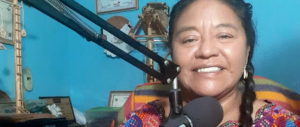By: Christian González
Journal of Global Rights and Organizations, Associate Articles Editor
GUATEMALA – Two recent cases involving actions of the Guatemalan government against local indigenous radio stations have been reported and brought to the Inter-American Court of Human Rights (hereinafter “the Inter-American Court”) and the Government of Guatemala, by the Inter-American Commission on Human Rights (IACHR).

The first involves the legal obstacles faced by four local stations operated by indigenous people, including access to radio frequencies and criminal consequences imposed on any unauthorized operations. The second involves the arrest, detention, and delayed hearing process of indigenous journalist Anastasia Mejía Triquiz.
On April 3rd, 2020, the IACHR presented a merits report to the Inter-American Court regarding four Guatemalan radio stations, each operated by a different indigenous ethnic group. These four are: a station based in Sumpango operated by Kaqchikel Maya, a station based in San Miguel Chicai operated by the Achí Maya, a station based in Cajolá operated by Mam Maya, and a station based in Todos Santos Cuchumatán operated primarily by Maya of Mam heritage. The IACHR found that the Guatemalan government placed legal barriers that prevent access of radio frequencies to local indigenous communities and caused indirect discrimination against them.
Guatemalan law dictates that radio frequencies are assigned to parties that can produce the highest financial offer, making it essentially a bidding process. The IACHR asserts that this burdens indigenous communities due to the fact that many suffer from poverty and cannot afford to make competitive offers. This in turn disenfranchises these communities from lawful radio broadcasting. Article 13.3 of the American Convention states that “[t]he right of expression may not be restricted by indirect methods or means, such as the abuse of government or private controls over newsprint, radio broadcasting frequencies…. or by any other means tending to impede the communication and circulation of ideas and opinions.” According the IACHR, the Guatemalan government has violated Article 13.3 by imposing these funds-based restrictions, effectively preventing indigenous communities from preserving and sharing their culture and language through community radio stations.
Furthermore, Guatemalan law criminalizes unauthorized operation of radio broadcasts as a theft offense, which the IACHR views as an additional burden on indigenous communities and as government censorship, a violation of Article 13.2 of the American Convention. The IACHR has compiled a list of remedial recommendations for the government to follow that include increased access to radio frequencies, refraining from the use of criminal law against indigenous communities, and full reparations to those communities already harmed. The case is pending in the Inter-American Court, which is currently waiting on receipt of written arguments from parties.
On October 22nd, 2020, the IACHR Office of the Special Rapporteur for Freedom of Expression released a statement to the Guatemalan government regarding the arrest and detention of Anastasia Mejía Triquiz. Mejía Triquiz is a journalist of K’iche Maya heritage and the director of the Xolabaj Radio and TV stations based in Joyabaj. On September 22nd, she was arrested by the National Civil Police on charges of sedition and attempt with aggravated arson and aggravated robbery, though further justification of these charges has not been given by the government.
The Office believes that Mejía Triquiz’s arrest is possibly linked to her coverage of local demonstrations against the alleged corruption surrounding Joyabal Mayor Francisco Carrascosa’s use of COVID-19 relief funds. Her coverage and criticisms of Carrascosa were broadcasted on Xolabaj’s Facebook page.
Mejía Triquez has been detained for 31 days without a judge’s official order of pre-trial detention. Her first statement hearing has been postponed twice, and it seems she will have been detained for a total of 37 days before her first hearing. The Office alleged that this is a deprivation of her personal liberty and freedom of political speech, and acknowledges the indirect censorship effects this has on other indigenous broadcasters. In its press release, the Office called on the Guatemalan government to respect the expression and liberty rights of Mejía Triquez and to guarantee her a diligent investigation of the charges brought against her.
The Office stated that it believes that Mejía Triquez’s arrest and the above pending case in the Inter-American Court constitute an ongoing effort by the government to quash the freedom of expression rights of indigenous community broadcasters throughout Guatemala.
For further information, please see:
Inter-American Commission on Human Rights – American Convention on Human Rights – 22 Nov. 1969
Facebook – Xolabaj Radio – Last Updated Oct. 19, 2002